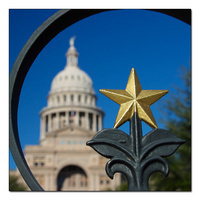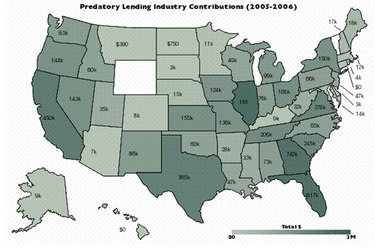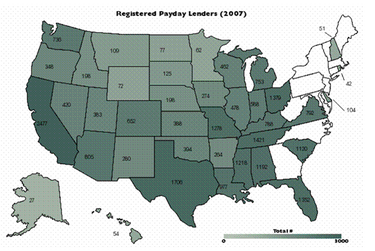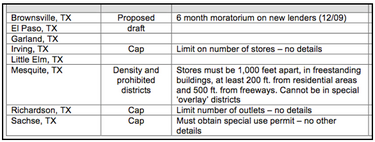"WHY INTEREST RATES ARE NOW 1100 PERCENT IN THE LONE STAR STATE"
April 15, 2010
When Jesus chased the money changers from the temple, he was protecting the poor from usury—something prohibited by most of the world’s major religions. Since the founding of the Republic, Texas has upheld this tradition with strict anti-usury laws. What about today?
Written by Senator Eliot Shapleigh, www.shapleigh.org

When Jesus chased the money changers from the temple, he was protecting the poor from usury—something prohibited by most of the world’s major religions. Since the founding of the Republic, Texas has upheld this tradition with strict anti-usury laws. What about today?
From the streets of Laredo to Beaumont, interest rates are as high as 1153 percent.
Today, the Vice President for Government Affairs at one of America’s biggest predatory lenders is the Chairman of the Finance Commission of Texas. And it is this Commission that is charged with protecting you.
So what happened in Texas?
Following the Texas revolution in 1836, the new Republic of Texas advertised in East Coast papers to lure bodies here. As a new nation, on the frontier with Mexico, Sam Houston and others feared that Santa Ana might return, so young Texas did everything possible to lure debtors here—to settle, thrive and defend Texas.
Often, people fleeing crushing debt in other parts of the country would scrawl in chalk on the doors of their abandoned houses the initials G.T.T. for "Gone to Texas."
In fact, Texas' debtor protection laws have been among the most protective throughout U.S. history—that is, until Rick Perry became Texas’ Governor.
In 2007, the U.S. Congress passed a law restricting payday lenders from charging more than 36 percent interest to active duty soldiers or their families. Since then, seven state legislatures have attempted to expand the law and cap the interest rate at 36 percent for all citizens. According to the Center for Responsible Lending, fifteen states currently prohibit payday loans by capping interest rates.
In 2003, nearly 50 bills relating to the predatory lending industry in 23 states were introduced. In 2007, 33 state legislatures introduced more than 100 bills. Payday lenders have countered these attempts by lawmakers across the country to increase regulation of predatory lending by upping their political giving. Since the 2000 election cycle, companies and associations representing the predatory financial services industry have contributed more than $10.2 million to state-level candidates and party committees in 41 states, and individuals associated with the predatory lending industry gave another $3.54 million in 45 states.
In Texas, the campaign contributions worked like a charm on Perry, who has actively thwarted any regulatory reform of the lending industry throughout his tenure. Thus, while scores of states have cracked down on predatory practices such as pre-payment penalties and loan flipping, effectively putting the brakes on usury, Texas has become a safe haven for the predators and a hot bed of predatory lending.
Payday lending, in particular, has flourished. Payday loans are short-term, high-cost loans secured with a check post-dated to payday. Payday loans trap consumers—borrowers are largely low-income, minority, or members of the military—in a cycle of debt that often leads to financial ruin. The explosion of this industry over the last ten years offers a poignant illustration of Perry’s failure to protect Texas consumers.
Payday lenders have actively wooed Texas politicians in an effort to prevent greater regulation. Cash America, a Texas-based payday lender, made almost $825,000 in political contributions nationwide from 1999 to 2006.
During this time period, Texas ranked 5th in the nation in total political contributions from the payday lending industry. The industry has given $715,982 since 2000, over half of which was donated in 2006:
While Texas law technically prevents payday lending, the Texas Legislature has maintained a loophole for predatory lenders that allows them to operate outside the law. Since 2005 most major payday lenders have used this loophole to brazenly ignore Texas usury laws. As a result of this loophole, while the number of states that have banned payday lending continues to grow, in Texas the industry is flourishing.
Click here to view larger image.
Texas-based lenders now charge among the highest interest rates in the nation, with up to 1,150 percent APR routinely charged on payday loans:
Click here to view larger image.
The loophole scam works like this: A payday lender hands in its lending license and registers as a “Credit Services Organization” (CSO), which is not regulated under state law. Unregulated by the Office of Consumer Credit Commissioner, CSOs can charge as much interest as they want by calling it “fees,” and consumers are defenseless. The state is powerless to enforce its usury laws, keep tabs on unscrupulous business practices, or collect loan data.
Astonishingly, payday loans cost Texas families annually nearly double what the state sets aside for financial aid to help Texas kids attend college. A recent study calculated the financial impact of predatory lending on Austin, Dallas, El Paso, Houston, Fort Worth, and San Antonio. In these cities alone, unregulated payday lenders lent $1.14 billion in 2006. Statewide, the total loan volume was at least $42 billion. To obtain these cash advances, working Texans paid at least $400 million in interest and fees, not to mention bank overdraft fees and credit costs ensuing from overzealous collection practices.
In the absence of state regulation, several cities in Texas have passed local ordinances to combat this plague:
Click here to view larger image.
What do other states do?
In Georgia, payday lending is explicitly prohibited and a violation of racketeering laws. New York and New Jersey prohibit payday lending through their criminal usury statutes, limiting loans to 25 percent and 30 percent annual interest, respectively.
In several states, payday lending is not specifically authorized and is de facto prohibited by small loan rate caps. These states include Connecticut, Maryland, Massachusetts, North Carolina, Pennsylvania, Vermont, West Virginia, and the District of Columbia.
For a listing of the legal status of predatory lending across the nation, please click here.
What can you do? You can write Rick Perry today and ask him to terminate William White as Chair of your Finance Commission. He is the Vice President of Government Affairs at Cash America that now acts as Chair. Second, you can write your Senator and ask them to close the CSO loophole. Moreover, ask him or her to file bills to limit usury to "just 36 percent," like it is in15 other states, the District of Columbia and the military, which restrict the cost of payday loans to around 36 percent APR. Finally, petition your City Council to ban predatory lending in your city. If state government won’t solve the problem—take action with your Mayor—and be part of the solution. Time is money—and time is wasting!
![]()
![]()
Related Stories



